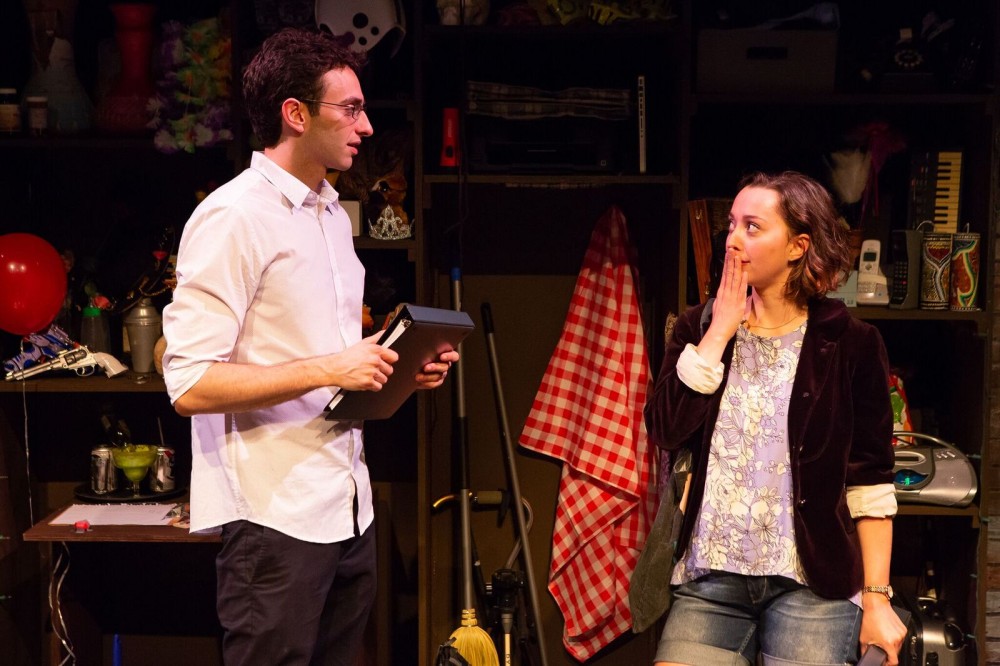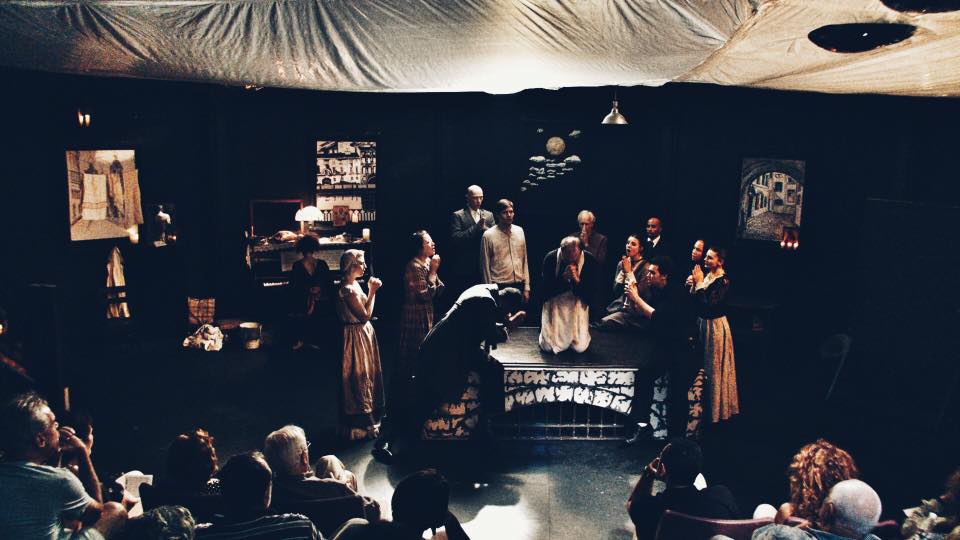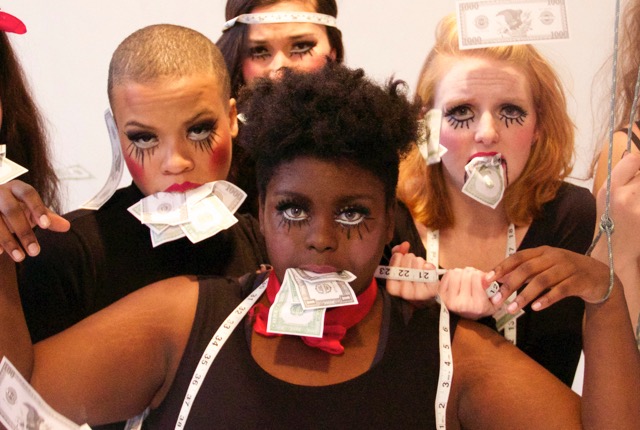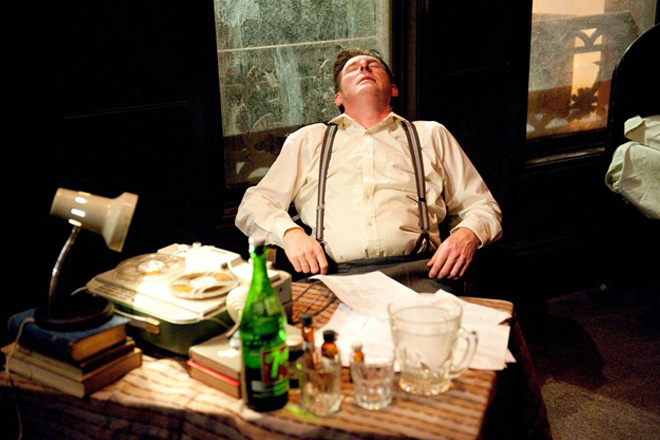by Myra Chanin
The New Yiddish Rep’s current production of Awake and Sing, Clifford Odets’ 1935 American masterpiece, is a 21st century miracle. It validates Artistic Director David Mandelbaum’s mishegas/obsession of establishing a Yiddish acting company performing modern plays, either written or translated into Yiddish, that attract diverse appreciative audiences of many ages, which describes the ticket holders at the performance I attended
The New Yiddish Rep’s firstborn, the groundbreaking Yiddish Waiting for Godot, was praised by both The New York Times and The New Yorker. It was not only a surprise hit here but also killed at the International Beckett Festival in Enniskillen, suggesting that the Irish may actually be a lost tribe of Israel. It starred and was translated by the astonishing Shane Baker, a would-you-believe Yiddish-obsessed Midwestern Episcopalian who now speaks Yiddish like he was raised in Berditchev. Since then, major New Yiddish Rep productions have included Death of a Salesman which received two Drama Desk nominations, one for Best Revival and a second for leading actor Avi Hoffman whose Willie Loman spoke the language he actually spoke. Last winter’s production of Sholem Asch’s God of Vengeance was very compelling. It was about a Jewish brothel owner willing to pay anything for a respectable rabbinical husband for his pure daughter, who unfortunately was already in lust with one of his sex workers. If the plot sounds familiar, it’s because the play became the cornerstone of Paula Vogel’s Tony-winning Indecent. Incidentally, FYI, Yiddish is once again hip. It’s being taught at our finest universities including UCLA, Columbia, Binghamton, Brandeis, even Duke and Emory. So Mazel Tov, ya’ll.
Why do I think the New Yiddish Rep’s Awake and Sing is a Miracle of Miracles? Because until now, multi-character Yiddish productions were forced to cast actors with little or no familiarity with Mamalushen – the mother tongue. They learned their lines syllable by syllable and garbled the Yiddish words so badly that even someone like me, who spoke Yiddish before she spoke English, had to check the English supertitles to figure out what they actually meant. But now Yiddish speaking actors are coming out of the woodwork. Mandelbaum has gradually unearthed enough aspiring young actors who grew up in Yiddish-speaking households and can express the emotions behind the words with their voices and body movements because the subtleties of Yiddish are ingrained in their DNA.
Where have these young’uns been hiding? In Brooklyn, encased in prayer shawls. They’re the offspring of that Orthodox Community who will no longer allow to have their lives constrained by Hassidism’s intellectual restrictions. One of them, Eli Rosen, a recovering lawyer, translated and starred in the company’s previous production, Eugene Ionesco’s Rhinoceros, and is presently translating two short plays by the Israeli playwright Hanoch Levin for a future production with his fellow players in what is becoming a Yiddish repertory company.
Awake and Sing contains the skeleton of every 1930 Jewish household I can remember. Myron Berger (Eli Rosen) is the passive, but hard-working lawyer/father. His wife Bessie (Ronit Asheri-Sandler), is the financially insecure, rejecting mother who only wants “the best” for their children. Daughter Hennie (a role shared by Lea Kalisch and Mira Kessler) is the modern working woman ensnared in an age-old trap. Her brother Ralph (Moshe Lobel) is the lost but ambitious son, too insecure to untie that apron strings that bind him to his mother. Their maternal grandfather Jacob (David Mandelbaum) is a revolutionary who endlessly talks rather than does … until he does. The family “success,” their unmarried, rich, dress-designer Aunt Mimi (Amy Coleman) most likely worked part of her way up the ladder on her back. Sam Feinschreiber (Luzer Twersky) is the schlemiel who was happily and hastily married off to Hennie without a clue to what was what. Boarder Moe Axelrod (Gera Sandler) is a petty crook wannabe bigtime gangster who loves Hennie despite his bluster. Amy Coleman (co-founder of the company and the wife of Artistic Director David Mandelbaum) is the only non-Yiddish speaker in the cast, and she cleverly gets to say almost all of her lines in English.
Despite my clichéd descriptions, every one of these characters comes to life as a complex, striving, unique human being, flaws and all. They all long for financial security and romantic love. The actors really inhabit the souls of their characters and bring them to life in ways that make your heart stand up and cheer.
The actors are hardly Moishe-Come-Latelys. Gera Sandler is an Israeli Yiddish Theater star/ director, TV personality, featured in international films and his wife Ronit has starred in many Israeli productions as well. As for the Brooklyn contingent, Luzer Twersky has appeared in HBO’s Transparent, will be soon seen in HBO’s High Maintenance. His life is the subject of the Netflix Film, One of Us. Moshe Lobel landed a Yiddish speaking role on a 2018 HBO comedy series and is also producing the new web series entitled Untold Genius. All of the others actors have appeared previously in New Yiddish Rep productions.
David Mandelbaum’s adaptation of Chaver Payer’s translation shortened and tightened the play by properly downplaying the political aspects. Under his direction, the actors perform so naturally that the man sitting beside me felt he was in his father’s house.
Praise and appreciation are also due those who work behind the scenes. Three cheers for Nathan Rodan’s living room’s pretentious perfection, lacking only crocheted antimacassars to extend the life of the upholstered armrests. Gail Cooper-Hecht’s costumes were tacky and equally period perfect. If Diane von Furstenberg sees this play, they’ll soon be the rage again. The music that Jesse Freedman chose to play between the acts particularly delighted me. Every Sunday Morning over WEVD! Joe and Paul’s! A Manischewitz commercial! And a personal favorite of mine “Levine and His Flying Machine.” The plane in which Levine rode lost the race with Lindbergh but became the world’s first transatlantic passenger.
One last comment. Do you have to know French to enjoy a François Truffaut film or German to appreciate Werner Herzog’s work? No siree. You just have to be able to read the English titles. The same applies to Awake and Sing. Go. Enjoy a moving, nostalgic but realistic play with a plausibly happy ending and titles that are easy to see.
Photos: Pedro Hernandez
Performances of AWAKE AND SING! are Tuesdays through Saturdays at 7:30 pm, with matinees Saturday & Sunday at 2 pm through December 24th. Tickets are available through www.NewYiddishRep.org or by calling 646-395-4310.
Theater at the 14th Street Y
344 East 14th Street/First Avenue


























